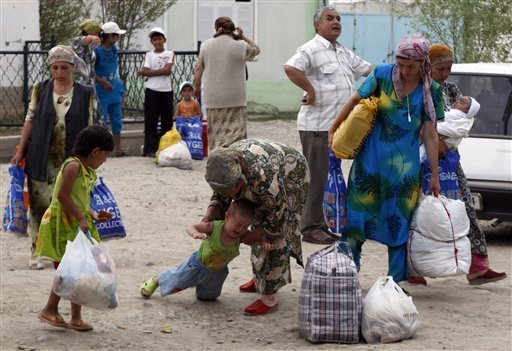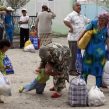
Astana and Tashkent Pursue Reconciliation Following the Kyrgyz Crisis
Publication: Eurasia Daily Monitor Volume: 7 Issue: 125
By:

The clashes between Kyrgyz and ethnic Uzbeks in the Osh and Jalalabad regions of Kyrgyzstan forced the Uzbek and Kazakh Presidents, Islam Karimov and Nursultan Nazarbayev, to abandon their rivalry and contemplate ways of cooperating in the face of the growing impact of the Kyrgyz unrest on the public mood in their countries. Although an inter-ethnic dimension was present in the violence, the unprecedented carnage in Osh reflects the intense power struggle plaguing all authoritarian Central Asian regimes without exception. Analysts in Kazakhstan noted that the crisis in Kyrgyzstan was incited by the close relatives of the ousted President, Kurmanbek Bakiyev (Delovaya Nedeli, June18).
During his visit to Astana, China’s President, Hu Jintao, showed little interest in Kyrgyzstan’s “internal affairs,” limiting Chinese commitments within the Shanghai Cooperation Organization (SCO) to humanitarian aid to Kyrgyzstan. Roza Otunbayeva, the head of the Kyrgyz interim government, did not secure a positive response from Moscow to her repeated requests to dispatch Russian troops to Kyrgyzstan, allegedly to guard the strategically important infrastructure in the rebellious regions. The Russian-led Collective Security Treaty Organization (CSTO) conspicuously ignored the riots in Osh and Jalalabad with far-reaching repercussions, and proved an utterly ineffective tool for fulfilling the tasks for which it was created. Given the reluctance of influential allies within the SCO, Russia and China, to become militarily involved in Kyrgyzstan, Tashkent and Astana had no alternative to pursuing an uneasy and painful rapprochement.
Although the relationship between the two rivals has proved tense, Astana always demonstrated its readiness to support Islam Karimov’s unstable regime. Prior to the recent SCO summit in Tashkent, Kazakh security forces and police units carried out a large-scale migrant operation targeting Uzbek religious refugees in Almaty. Unofficial sources reported that plain-clothed officers from the Kazakh National Security Committee (KNB) broke into the homes of Uzbek refugees and searched their rooms. At least 42 refugees were detained and taken to police stations for interrogation without any criminal charge presented to them. Later, the interior ministry department in Almaty announced that all the detainees belonged to criminal Islamist extremist organizations operating in Tashkent, and were wanted by the Uzbek security services. Although no proof of their anti-government activities was presented, the Kazakh interior ministry disclosed plans to extradite the refugees to Uzbekistan where they might face imprisonment and torture. This aroused sharp criticism from the Memorial human rights movement. Uzbek refugees appealed to the Almaty office of the United Nations High Commissioner for Refugees (UNHCR) for protection of their legal rights (www.newsru.com, June 11).
The scandal over Uzbek refugees placed the Kazakh authorities in a delicate situation. On the one hand, Kazakhstan signed international human rights agreements as far back as 1998, including the convention against torture and other inhuman treatment of the detained persons. On January 1, 2010 the Kazakh government enacted a law on refugees allowing the problems of political asylum seekers to be resolved according to internationally accepted regulations. Many of these functions, such as granting refugee status to foreigners, were delegated by the UNHCR office in Almaty to the Kazakh authorities. On the other hand, the necessity to improve relations with Tashkent, fearing a “color revolution,” demands some political concessions to Karimov, even if it damages the reputation of Kazakhstan in the eyes of the international community.
Another concern in Kazakhstan was the flood of Uzbeks fleeing the eruption of inter-ethnic violence in Kyrgyzstan. Immediately after the Osh riots, Kazakh border authorities denied entry into Kazakhstan for ethnic Uzbeks fleeing Kyrgyzstan. Although the KNB did not provide any official comment on the ban, one explanation may be the growing threat of terrorism in Central Asia as a consequence of the Kyrgyz crisis. The First Deputy Head of the Anti-terrorist Center, Moldiar Orazalinov, described the situation in the region as “totally uncontrollable” (www.today.kz, June 16).
During the Tashkent SCO summit, Nazarbayev called upon member states to provide humanitarian assistance to Kyrgyzstan and ensure that regional security would be the central focus of the SCO. However, this urgent issue requires more than a mere declaration of war on separatism, terrorism and cross-border activities of organized criminal gangs. Motives for counteracting terrorism and religious extremism as defined by SCO member states are too different to achieve genuine and meaningful coordination of their activities. China is primarily concerned with the rise of Islamic movements in the Xingjian Uyghur Autonomous Republic; Islam Karimov’s main problem is a home-grown opposition in alliance with religious extremists; Astana, the largest investor in the Kyrgyz economy, has both economic and security interests; while Moscow regards Central Asia merely as a buffer zone to ward off extremist incursions from beyond its borders. Assuming the SCO chairmanship after the recent summit in Tashkent, Kazakhstan is faced with reconciling these differences.




